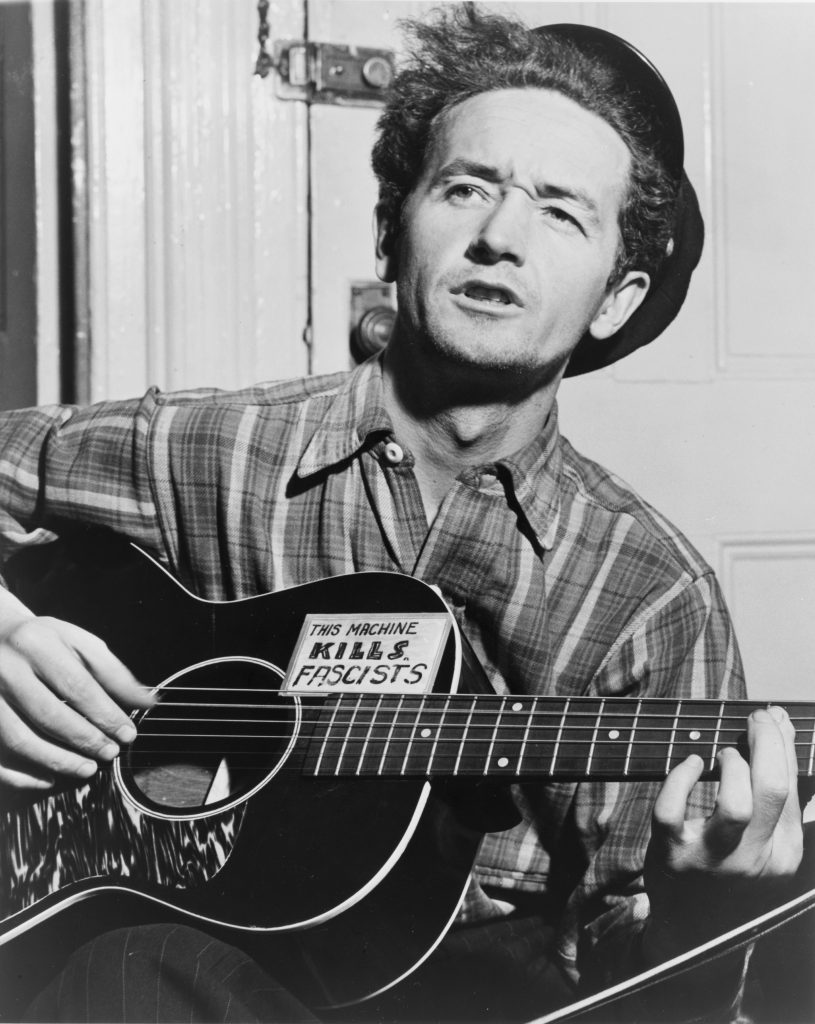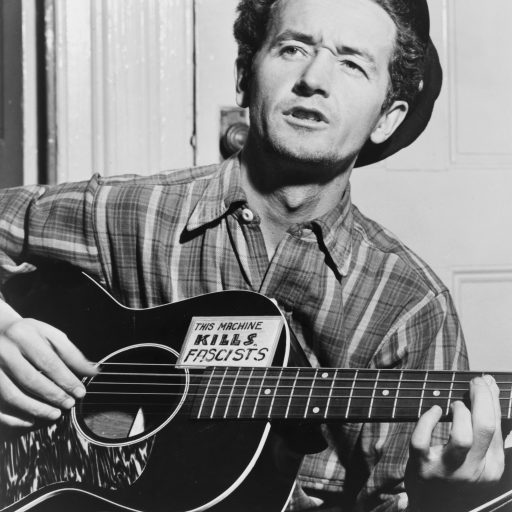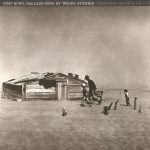
“This machine kills fascists”
It would be impossible to overestimate Woody Guthrie’s impact on American folk music. His contributions to the canon of protest songs are undeniable. His music rallies against fascism, racism, and other injustices.
Even though Woody’s initial attempts at a music career began in the early 1930s, he started to gain a wider audience in 1937 when he got a job at a Los Angeles radio station, KFVD. Along with traditional tunes, he would also perform original songs.
Some of the tunes he penned while working at the radio station appeared on his first commercial recording, Dust Bowl Ballads. The 1940 released album is widely considered one of the first concept albums (that same year, he recorded with noted music archivist Alan Lomax for the Library of Congress). The tunes dealt with the economic and social hardships experienced in the Dust Bowl. It also addresses the challenges faced by migrant workers.
One of the highlights of the album was Tom Joad Part 1 and 2, which uses the protagonist of John Steinbeck’s 1939 novel The Grapes of Wrath to address issues of injustices. Bruce Springsteen was inspired by Guthrie to explore similar themes with his 1995 tune “The Ghost of Tom Joad” (Springsteen has been known to cover Woody’s “Tom Joad” during
In 1940, he also wrote one of his most famous compositions, This Land Is Your Land, (one of the best protest songs of all time) which he recorded in 1944. This open border anthem continues to remain relevant.
Another significant event took place in 1940 when he met Pete Seeger at a John Steinbeck-hosted benefit to provide aid for migrant farm workers. This led to his involvement with the protest music collective, the Almanac Singers. Woody composed “Union Maid,” which appeared on the group’s 1941 album Talking Union & Other Union Songs.
The bulk of his recordings took place between 1944-45 for Moses Asch. Many of these were later reissued between 1997-1999 in four volumes entitled Asch Recordings. Some of the masters weren’t released until 2009 as part of a four-disc box set entitled My Dusty Road.
During his’s lifetime, he published two novels. He was also a prolific writer who wrote close to 3000 lyrics, along with composing several poems and prose, much of which are unpublished.
A notable protest standard that Guthrie wrote but never recorded is “Deportee (Plane Wreck at Los Gatos).” He wrote it as a poem about the January 28, 1948 plane crash near Los Gatos Canyon, which killed 32 people, 28 of them being migrant farm workers who were being deported back to Mexico. In 1958, a school teacher named Martin Hoffman composed music for it, and shortly after that, Pete Seeger and several other artists started to perform and record it.
In modern times, he continued to have an indelible impact, inspiring a new generation of like-minded artists. For example, there were the two volumes of the Mermaid Avenue albums by Billy Bragg & Wilco, which featured some of his unused lyrics. The Celtic punks Dropkick Murphys also released a couple of albums featuring unused Woody lyrics.
Also, his writings about Donald Trump’s father, Fred, have been unearthed. Fred Trump owned the Beach Haven apartment that Guthrie rented during 1950-52. Some of his writings reworked the lyrics of his 1940 classic “I Ain’t Got No Home” into “Beach Haven Ain’t My Home”. Multiple artists such as Ryan Harvey and US Elevators have written music and incorporated Guthrie’s words into songs (both these versions were recorded as “Old Man Trump”). Guthrie’s denouncement of Fred Trump’s racism took on renewed resonance during the 2016 US Presidential Election (and subsequent elections).
Even from the


